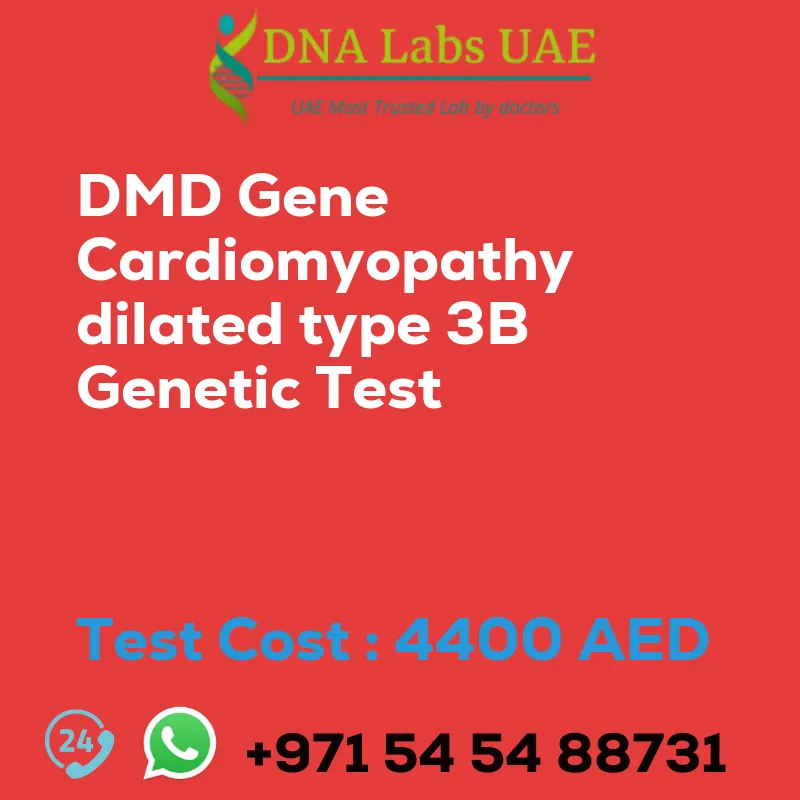DMD Gene Cardiomyopathy dilated type 3B Genetic Test
Components: DMD Gene Cardiomyopathy dilated type 3B Genetic Test
Price: 4400.0 AED
Sample Condition: Blood or Extracted DNA or One drop Blood on FTA Card
Report Delivery: 3 to 4 Weeks
Method: NGS Technology
Test Type: Cardiovascular Pneumology Disorders
Doctor: Cardiologist
Test Department: Genetics
Pre Test Information: Clinical History of Patient who is going for DMD Gene Cardiomyopathy, dilated type 3B NGS Genetic DNA Test. A Genetic Counselling session to draw a pedigree chart of family members affected with DMD Gene Cardiomyopathy, dilated type 3B NGS Genetic DNA Test gene DMD
Test Details: DMD (Duchenne muscular dystrophy) gene cardiomyopathy, dilated type 3B is a genetic disorder characterized by the mutation in the DMD gene, which is responsible for producing a protein called dystrophin. This condition primarily affects the heart muscles, leading to the development of dilated cardiomyopathy. Dilated cardiomyopathy is a condition in which the heart becomes enlarged and weakened, leading to poor pumping of blood. Symptoms of this condition may include shortness of breath, fatigue, irregular heartbeats, and swelling in the legs and ankles. NGS (Next-Generation Sequencing) genetic testing is a type of genetic test that uses advanced sequencing technologies to analyze multiple genes simultaneously. In the case of DMD gene cardiomyopathy, dilated type 3B, NGS genetic testing can identify mutations or variations in the DMD gene that may be responsible for the development of the condition. NGS genetic testing can help in the diagnosis of DMD gene cardiomyopathy, dilated type 3B by detecting specific mutations in the DMD gene. This information can be useful for healthcare providers in determining the appropriate treatment and management strategies for affected individuals. It is important to note that genetic testing should be conducted under the guidance of a healthcare professional or genetic counselor who can provide appropriate counseling and interpretation of the results.
| Test Name | DMD Gene Cardiomyopathy dilated type 3B Genetic Test |
|---|---|
| Components | |
| Price | 4400.0 AED |
| Sample Condition | Blood or Extracted DNA or One drop Blood on FTA Card |
| Report Delivery | 3 to 4 Weeks |
| Method | NGS Technology |
| Test type | Cardiovascular Pneumology Disorders |
| Doctor | Cardiologist |
| Test Department: | Genetics |
| Pre Test Information | Clinical History of Patient who is going for DMD Gene Cardiomyopathy, dilated type 3B NGS Genetic DNA Test. A Genetic Counselling session to draw a pedigree chart of family members affected with DMD Gene Cardiomyopathy, dilated type 3B NGS Genetic DNA Test gene DMD |
| Test Details |
DMD (Duchenne muscular dystrophy) gene cardiomyopathy, dilated type 3B is a genetic disorder characterized by the mutation in the DMD gene, which is responsible for producing a protein called dystrophin. This condition primarily affects the heart muscles, leading to the development of dilated cardiomyopathy. Dilated cardiomyopathy is a condition in which the heart becomes enlarged and weakened, leading to poor pumping of blood. Symptoms of this condition may include shortness of breath, fatigue, irregular heartbeats, and swelling in the legs and ankles. NGS (Next-Generation Sequencing) genetic testing is a type of genetic test that uses advanced sequencing technologies to analyze multiple genes simultaneously. In the case of DMD gene cardiomyopathy, dilated type 3B, NGS genetic testing can identify mutations or variations in the DMD gene that may be responsible for the development of the condition. NGS genetic testing can help in the diagnosis of DMD gene cardiomyopathy, dilated type 3B by detecting specific mutations in the DMD gene. This information can be useful for healthcare providers in determining the appropriate treatment and management strategies for affected individuals. It is important to note that genetic testing should be conducted under the guidance of a healthcare professional or genetic counselor who can provide appropriate counseling and interpretation of the results. |








